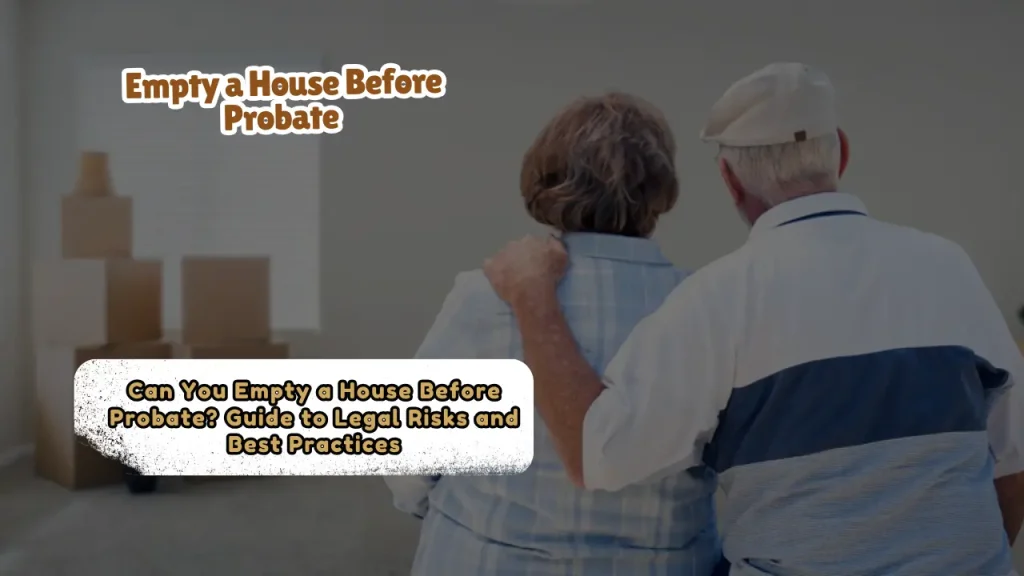Can You Empty a House Before Probate? Guide to Legal Risks and Best Practices
No, you generally cannot empty a house before probate unless:
- You are the executor with explicit court permission.
- The items removed are perishable or at risk of damage/theft.
- All heirs unanimously agree and document the removal.
Otherwise, removing belongings prematurely may violate probate laws, leading to accusations of theft or mishandling estate assets.
When dealing with the estate of a loved one, you might wonder if you can clear out their home before probate concludes. While emptying a house might seem practical (e.g., to prepare for sale or avoid storage costs), doing so without court approval can lead to serious legal consequences. Here’s what you need to know.
Table of Contents
Why Probate Restricts Access to the House?
Probate courts aim to:
- Preserve the estate’s assets until debts and taxes are paid.
- Ensure fair distribution according to the will (or state law if no will exists).
- Prevent fraud or mismanagement by heirs or third parties.
Emptying the house risks depleting assets that creditors or heirs are entitled to, making courts cautious.
When Is It Legal to Remove Items?
1. Executor Authority
- If you’re the court-appointed executor, you can manage the estate but must inventory all items before disposing of them.
- Court approval is often required to sell, donate, or discard assets.
2. Perishable or At-Risk Items
- Perishables (food, plants) or items prone to damage (e.g., electronics in an unheated house) can be removed.
- Secure valuables (jewelry, cash) to prevent theft, but document their transfer.
3. Heir Agreement
- If all heirs consent in writing, minor items (clothing, non-valuables) may be removed.
- Major assets (art, heirlooms) should stay until probate closes.
4. Small Estate Exceptions
Some states allow simplified probate for estates under a threshold (e.g., $50k in California), letting heirs access assets faster.
Related article: Legally Sell A Deceased Person’s Car Without Probate
Risks of Emptying a House Without Permission
- Legal Penalties: Fines, removal as executor, or criminal charges for theft.
- Heir Disputes: Family members may sue for mismanagement.
- Creditor Claims: Removing assets could leave the estate insolvent, triggering lawsuits.
Example: An heir who takes furniture before probate might have to return it or pay its value to the estate.
Steps to Legally Empty a House During Probate
- File an Inventory: List all items in the house for court records.
- Request Court Approval: Petition to remove specific items (e.g., for sale or safety).
- Document Everything: Photograph items, log removals, and keep receipts.
- Notify Heirs/Creditors: Transparency prevents disputes.
Related article for you:
Does a Pour-Over Will Avoid Probate? What You Need to Know to Protect Your Estate

Alternatives to Emptying the House
- Secure the Property: Change locks, install alarms, or hire a property manager.
- Insurance: Ensure the home and contents are insured against damage/theft.
- Temporary Storage: Move items to a secure storage unit without disposing of them.
State-Specific Rules
| State | Key Probate Rules for Property Access |
| Texas | Independent executors can act without court approval. |
| Florida | Requires court petitions for most asset transfers. |
| California | Strict penalties for unauthorized asset removal. |
What to Do If You’ve Already Emptied the House
- Restore Removed Items: Return possessions immediately.
- File an Amendment: Update the estate inventory with the court.
- Consult an Attorney: Mitigate legal risks with professional help.
Key Takeaways
- Never empty a house before probate without court or heir consent.
- Executors must follow strict protocols to avoid liability.
- Documentation and transparency are critical to compliance.
Need Help?
- Consult a probate attorney before taking action.
- Use tools like SafeStamp to digitally log estate inventories.
Final Thoughts
While emptying a house before probate might seem practical, the legal risks far outweigh the convenience. Follow court procedures, communicate with heirs, and prioritize preserving the estate’s value. By acting responsibly, you honor your loved one’s legacy and protect yourself from costly disputes.
Note: Laws vary by state. Always seek legal advice tailored to your jurisdiction.
About the Author

Sarah Klein, JD, is an experienced estate planning attorney who has helped clients with wills, trusts, powers of attorney, and probate matters. At All About Lawyer, she simplifies complex estate laws so families can protect their assets, plan ahead, and avoid legal headaches during life’s most sensitive moments.
Read more about Sarah
